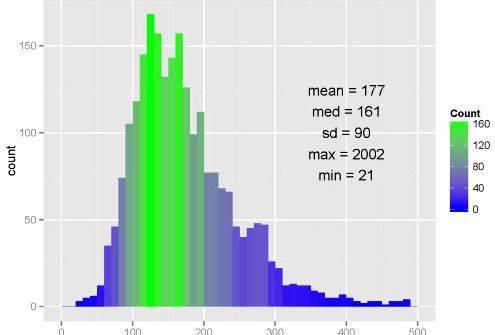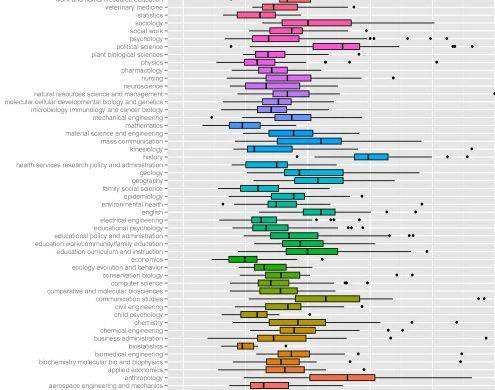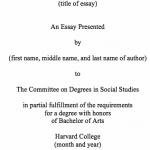The Dissertation Process
Prospectus: After receiving the M.Phil. (and occasionally before, when a prospectus is necessary for grant applications), the next step is to prepare a brief prospectus for a dissertation and to defend it before a committee of the faculty. This is the point in the program at which students, if they have not done so before, must choose formal advisors (the sponsor and second reader), who will be the principal supervisors of their dissertations. For the prospectus defense, students must also choose several other members of the faculty who, along with the sponsor, will read the prospectus and engage the student in a discussion of it. Prospectus committees normally consist of four or five members of the faculty. The prospectus itself should be approximately 15 double-spaced pages in length. It should include:
- A clear statement of the topic and a formulation of the particular historical problem that the project will address. It should position the topic within existing historical literature, explain the research approach or methodology to be used, and discuss the sources to be consulted.
- A tentative outline of chapters, with brief summaries of their proposed contents.
- A preliminary bibliography, listing the principal secondary sources and the major archival or other primary sources to be used.
- A tentative schedule for research, writing, and completing the project.
The student should download the Report of the Dissertation Proposal Committee form in advance and have the committee members sign it immediately after the prospectus defense. The completed form should be given to the Graduate Administrator for processing.
As of Fall 2012, doctoral students in the Arts and Sciences whose program requires a dissertation prospectus or proposal must defend it successfully within eight semesters of first enrolling in their doctoral program. (Students with two Registration Units of advanced standing must defend successfully within six semesters.) Failure to comply with this requirement will indicate a lack of satisfactory academic progress toward the degree.
This policy also applies to Arts and Sciences students who have not yet completed a seventh semester in their doctoral program (and for students with advanced standing, to those who have not yet completed a fifth semester).
Dissertation Writing: After defending the prospectus, the student will embark on the preparation of the dissertation. Students should think of writing a dissertation as the first step in writing a book, which most Columbia dissertations eventually become. Students will work on their dissertations under the supervision of their sponsors, and most also seek help from other members of the faculty, often including the members of the prospectus defense committee. There are also both formal and informal dissertation-writing workshops for students in many fields. Maintaining a continuing relationship with the sponsor and other members of the faculty is an important part of the process of developing a dissertation. So is sharing work with other graduate students. There is no fixed length for a dissertation, although it should approach-in both length and scope-the expectations of a published book.

Successful dissertations take many forms, but virtually all are based largely on primary sources and set out to make original contributions-empirical, interpretive or, ideally, both-to the field. Typically, the student applies for a Dissertation Writing Fellowship (DWF) for the next year, his or her fifth in the program.
Dissertation Application: The last step before receiving the Ph.D. is the formal defense of a completed dissertation. No defense will be organized unless the sponsor and second reader have signified that in their judgment the dissertation is acceptable and thus warrants a defense and final examination. It is the responsibility of the sponsor, not the student, to choose the members of the defense committee, but sponsors will ordinarily consult with students about who would be appropriate for the defense. A defense committee ordinarily includes five people, three of them members of the History Department faculty, and two of them outsiders, either from departments other than history at Columbia or from other universities. Outsiders from other universities may be historians.
Students intending to defend the Ph.D. dissertation must file an Application for Dissertation Defense. The form should be filled out by the student and sponsor, and delivered to the Graduate Administrator. The Department then schedules the defense. It is important to submit a defense application early in the term in which the defense is expected; students should consult the Graduate Administrator for the relevant deadlines.
Dissertation Defense: Despite the confrontational name of the exercise, the defense is usually a collegial conversation between the student and the faculty members of the committee during which the candidate is asked to explain aspects of the work and to answer questions about it. Often, the members of the committee see their task as offering advice on how to revise the dissertation for publication. The student begins the defense with a brief explanation of the project before fielding questions and comments from the members of the committee. A defense ordinarily lasts approximately two hours.
When a committee member can only participate from afar, an accommodation may be made by employing audio or video conferencing during the defense. A maximum of two members of the dissertation defense committee may participate remotely, but the committee chair and the sponsor must be present at the defense.
The dissertation defense committee may convene when one member is prevented from participating by extreme circumstances at the time of the defense. Such a last-minute absence will count toward the total of two members allowed to participate remotely. If possible, the absent member should submit before the defense a report containing comments, questions, and a provisional vote on the dissertation’s approval. The committee chair will convey these questions to the candidate at the defense and rule on the quality the responses made. If circumstances prevent the submission of a report before the defense, the absent member�s report should be sent as soon as possible after the defense to the dissertation defense committee chair and to the Dean of the Graduate School. The committee vote will not be considered final until the report is reviewed and the defense committee chair determines whether any further action is warranted.
Once the dissertation is successfully defended, it must be converted into what the Graduate School considers acceptable physical form and officially submitted to the University, along with a submission card (provided to the student at the defense) signed by the sponsor and the department chair. The Graduate Administrator can sign the submission card on behalf of the chair if the chair is not available. Students have six months from the time of the defense in which to make further revisions, but many students submit almost immediately after the defense, particularly if the defense is close to the time of Commencement. The submission of the completed dissertation is the last step before the awarding of the degree.
Registration status: All students must be registered during the term (including summer) in which they distribute the defense copies of the dissertation. Filing early in the semester is recommended to ensure approval of the defense committee before the deadlines. Provided that all required Residence Units are met, students who are distributing and/or defending must register for either MF or ER. Students who are defending while on teaching or research appointments, or who are also completing pre-dissertation degree requirements register for ER; all others, including those on Dissertation Writing Fellowships, should register for MF. These rules apply to the summer as well as to the fall and spring semesters.
If U.S. students distribute any time between the first day of the fall semester and the day before the start of the spring semester, their final registration is in the fall semester.
If U.S. students distribute any time between the start of the spring semester and the day before the start of summer session, their final registration is in the spring.
If U.S. students distribute any time between the start of summer session and the day before the start of the fall semester, their final registration is in the summer.
International students in F-1 or J-1 status must consult with the International Students and Scholars Office regarding their registration requirements.
Deposit and Graduation: The deposit, and not the defense, is the final requirement for the Ph.D. and professional degrees. After the successful defense and complete deposit of the dissertation, the degree is awarded on the next subsequent conferral date, in October, February or May of each year. Students must clear all outstanding accounts in order to receive their degree. See the GSAS site for more information on the deposit and award of the degree .
For complete information on the Dissertation process please visit the GSAS Dissertation Office page .





 Bijan djir sarai dissertation writing
Bijan djir sarai dissertation writing Harvard referencing phd dissertation requirements
Harvard referencing phd dissertation requirements Dissertation online rwth aachen stellenangebote
Dissertation online rwth aachen stellenangebote Dissertation proposal oral presentation topics
Dissertation proposal oral presentation topics Dissertation services in los angeles
Dissertation services in los angeles






